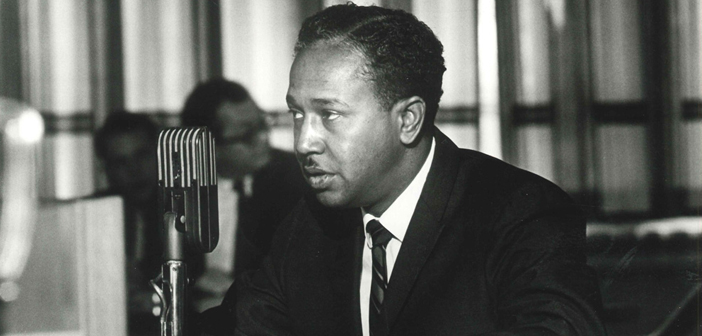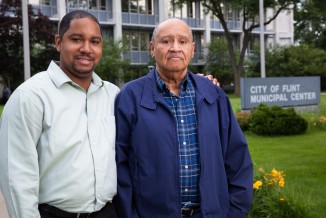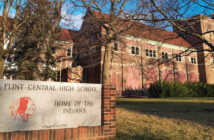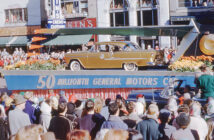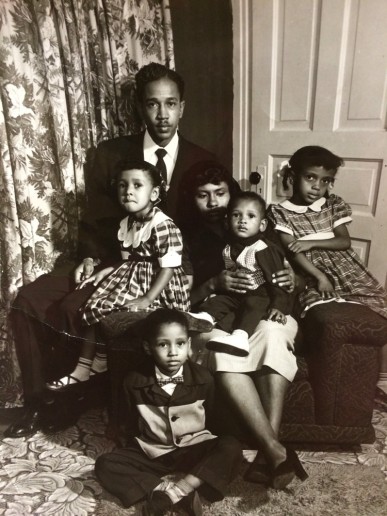 In 1966, a time when civil rights proponents and racially segregated neighborhoods were clashing across the country, Floyd J. McCree was selected by his fellow commissioners to be the next mayor of Flint. He had served on the city commission since 1958, but from 1966 onward, his name would be recognized as one of the country’s first black mayors.
In 1966, a time when civil rights proponents and racially segregated neighborhoods were clashing across the country, Floyd J. McCree was selected by his fellow commissioners to be the next mayor of Flint. He had served on the city commission since 1958, but from 1966 onward, his name would be recognized as one of the country’s first black mayors.
African American voices were beginning to receive greater representation in city governments during those tumultuous years. Robert Clayton Henry of Springfield, Ohio was also chosen mayor by that city’s commission in the same year as McCree, according to the Dayton Daily News Archive. An analysis by the University of Michigan found that Richard Hatcher of Gary, Indiana and Carl Stokes of Cleveland, Ohio were the first popularly-elected black mayors in their cities in 1966 and 1967, respectively. Whether appointed by their council or elected by popular vote, these leadership decisions were significant because no black mayors had been elected in the U.S. since the Reconstruction Era following the Civil War, nearly 100 years prior.
“He didn’t expect anything in return. He really cared about people, and they knew it.”
Byron McCree
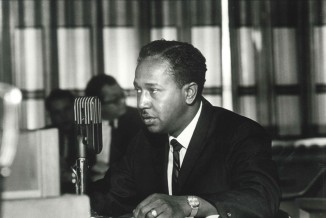 A sharp dresser with an easygoing manner, Mayor McCree had no trouble gaining the respect of the people he served from 1966 to 1968. Many residents openly supported his efforts to stand up for equal opportunity in employment and open housing for black residents at a time when Flint was robust with automotive jobs, successful retail and service industries, and active neighborhoods. Flint’s population was just under 200,000 between 1960 and 1970, as recorded by the U.S. Census. In contrast, the city’s population dropped to around 102,000 by 2010.
A sharp dresser with an easygoing manner, Mayor McCree had no trouble gaining the respect of the people he served from 1966 to 1968. Many residents openly supported his efforts to stand up for equal opportunity in employment and open housing for black residents at a time when Flint was robust with automotive jobs, successful retail and service industries, and active neighborhoods. Flint’s population was just under 200,000 between 1960 and 1970, as recorded by the U.S. Census. In contrast, the city’s population dropped to around 102,000 by 2010.
“He was always the people’s mayor,” says his son, Byron McCree, who was a young boy when his father became mayor. “He came from humble beginnings.”
The New York Times ran Mayor McCree’s obituary on June 18, 1988, noting his accomplishments as an early black mayor, and later as Register of Deeds for Genesee County. He grew up in a Christian family in Webster Grove, Missouri and attended Lincoln University, a college originally founded after the Civil War to provide higher education for African Americans. He served as an Army staff sergeant in the South Pacific during World War II. After his discharge from the military, McCree moved to Flint where he was hired at the Buick foundry; he became a foreman, then later a maintenance supervisor. He married Leeberta in 1948, and they raised their family in Flint.
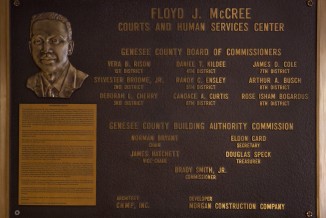 All of his life experiences leading up to his mayoral role seemed to direct Mayor McCree’s career path toward one of leadership. As mayor, he earned a reputation as a man who fervently represented the working class, and who worked hard to slice through the difficult problems caused by racial inequality and prejudices. He led with a strong conviction for improving the workings of the city and the relationships around him. His experience with doing physically demanding factory work kept him focused on important matters affecting the local work force.
All of his life experiences leading up to his mayoral role seemed to direct Mayor McCree’s career path toward one of leadership. As mayor, he earned a reputation as a man who fervently represented the working class, and who worked hard to slice through the difficult problems caused by racial inequality and prejudices. He led with a strong conviction for improving the workings of the city and the relationships around him. His experience with doing physically demanding factory work kept him focused on important matters affecting the local work force.
“He is unique in that he built an interracial coalition of people who supported him,” says grandson Kyle McCree, who is the Director of Business and Financing for the Flint and Genesee Chamber of Commerce, and bears a resemblance to his grandfather. “I think it helped him not only win, but become more effective as a leader and problem-solver.”
One of Mayor McCree’s most notable accomplishments was leading efforts toward the adoption of an open housing ordinance in Flint, which allowed black residents to buy homes in predominantly white neighborhoods. The issue was met with heated debate and opposition, but the measure passed in a February 1968 referendum. Flint’s fair and open housing ordinance was known as the first of its kind and set a new, clear standard for other cities across the nation. Prior to that victory, Flint residents had participated in public protests, a sleep-in in front of City Hall, and a unity rally attended by 4,000 people, including Michigan Governor, George Romney.
Breaking down racial barriers and supporting union interests remain prominent parts of his legacy, but Floyd McCree’s family says that his willingness to help people no matter their skin color, ethnicity, or economic background made him largely respected. He had a positive outlook on life, took extra time to connect people with differing opinions, and to increase opportunities for those in need of employment. In later years, he offered advice to professionals seeking to advance their political careers.
“He felt that if you had power and influence, you should help people and give back,” says Byron. “He was low-key and he thrived on doing things like that. He didn’t expect anything in return. He really cared about people, and they knew it.”
Floyd McCree served on the Flint City Commission until 1970, after which he lost a race for State Representative, and also ran for mayor against James Rutherford in the 70s. He served on the National Urban League’s Board of Trustees and remained actively involved in local politics and the Flint community until he died at age 65.
Proud of his father’s accomplishments as a political leader, hard worker and family man, Byron remembers his father taking their family to church every week, and being part of a generation that worked together to help the community move beyond racial barriers. Byron says, “We’ve come so far, but we still have a lot more to do.”
Photography By Mike Naddeo & Provided by The McCree Family

